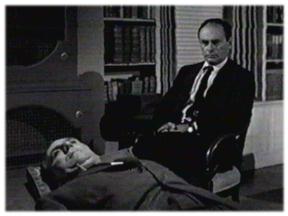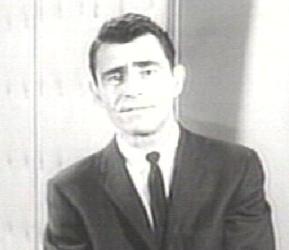Although advertised as science fiction, the show often (if not always) had a moral that pertained to everyday life. A popular success, it introduced many Americans to serious science fiction ideas while still managing to attract overwhelmingly positive critical attention. The success of this original series led to the creation of two revival series, a feature film, a radio series, a comic book and various other spin-offs that would span five decades.
Writers for The Twilight Zone included leading genre authorities such as Charles Beaumont, Richard Matheson, Jerry Sohl, George Clayton Johnson, Earl Hamner Jr., Reginald Rose, and Ray Bradbury. Many episodes featured adaptations of classic stories by such writers as Ambrose Bierce, Lewis Padgett, Jerome Bixby, and Damon Knight. Episodes featured some of Hollywood's biggest celebrities, including Charles Bronson, Carol Burnett, Robert Duvall, a very young Ronnie Howard, Buster Keaton, Jack Klugman, Lee Marvin, Burgess Meredith, Elizabeth Montgomery, Agnes Moorehead, Suzy Parker, Robert Redford, Don Rickles, Mickey Rooney, William Shatner, and Dick York. Rod Serling himself provided narration as well as on-camera introductions to many episodes.
Television history
The Time Element (1958)
In 1957, CBS purchased a teleplay that writer Rod Serling hoped to produce as the pilot of a weekly anthology series. The Twilight Zone: The Time Element marked Serling’s first entry in the field of science-fiction.
A time travel fantasy of sorts, the story involved a man visiting a therapist with complaints of a recurring dream in which he imagines waking up in Honolulu just prior to the Japanese attack on Pearl Harbor. "I wake up in a hotel room in Honolulu and it's 1941, but I mean I really wake up and it's really 1941," he tells his therapist, having concluded that these are not mere dreams; he is actually travelling through time. Taking advantage of the situation he bets on all the winning horses, all the right teams and, eventually, tries unsuccessfully to warn others - anyone: the newspaper, the military, anyone - that the Japanese are planning a surprise attack.
With this script Serling drafted the fundamental elements that would distinguish the series still to come: a science-fiction/fantasy theme, opening and closing narration and use of a trick ending. But what would prove popular with audiences and critics in 1959 did not meet network standards in 1957. “The Time Element” was purchased only to be shelved indefinitely, talks of making The Twilight Zone a series had ended.
This is where things stood when Bert Granet, the new producer for Westinghouse Desilu Playhouse discovered “The Time Element” in CBS’ vaults while searching for an original Serling script to add prestige to his show. “The Time Element” debuted on November 24, 1958 to an overwhelmingly delighted audience of television viewers and critics alike. “The humor and sincerity of Mr. Serling's dialogue made 'The Time Element' consistently entertaining,” offered Jack Gould of the New York Times as over six thousand letters of praise flooded Granet’s offices. Convinced that a series based on such stories could succeed, CBS again began talks with Serling about the possibilities of producing The Twilight Zone. Where Is Everybody? was accepted as the pilot episode, and the project was officially announced to the public in early 1959.
Original series (1959-1964)
Throughout the 1950s, Rod Serling had established himself as one of the hottest names in television, equally famous for his success in writing televised drama as he was for criticizing the medium's limitations. His most vocal complaints concerned the censorship frequently practiced by sponsors and networks. "I was not permitted to have my Senators discuss any current or pressing problem," he said of his 1957 production "The Arena", intended to be an involving look into contemporary politics. "To talk of tariff was to align oneself with the Republicans; to talk of labor was to suggest control by the Democrats. To say a single thing germane to the current political scene was absolutely prohibited... In retrospect, I probably would have had a much more adult play had I made it science fiction, put it in the year 2057, and peopled the Senate with robots. That would probably have been more reasonable and no less dramatically incisive."
This is precisely the thesis he intended to prove when, in 1959, he set out to create a weekly television series that, while featuring stories peopled by robots, aliens, and other fantastical beings would seek to offer dramatically incisive and involving looks into contemporary politics.
Twilight Zone’s writers frequently used science-fiction as a vehicle for social comment; networks and sponsors who had infamously censored all potentially "inflammatory" material from the then predominant live dramas were ignorant of the methods developed by writers such as Ray Bradbury for dealing with important issues through seemingly innocuous fantasy. Frequent themes include nuclear war, mass hysteria, and McCarthyism, subjects that were strictly forbidden on more "serious" prime-time drama. Episodes such as The Shelter or The Monsters Are Due on Maple Street offered specific commentary on current events while other stories (such as The Masks or The Howling Man) operated around a central allegory, parable, or fable that reflected the characters' moral or philosophical choices.
Despite his esteem in the writing community, Serling found The Twilight Zone a hard sell. Few critics felt that science-fiction could transcend empty escapism and enter the realm of adult drama. In a September 22, 1959, interview with Serling, Mike Wallace asked a question illustrative of the times: "...ou're going to be, obviously, working so hard on The Twilight Zone that, in essence, for the time being and for the foreseeable future, you've given up on writing anything important for television, right?"
Read more at Wikipedia.org




